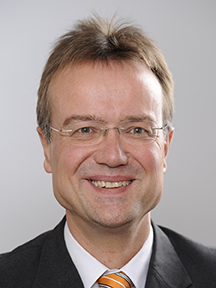

Best-Practice Interview
ifm electronic GmbH ranks among the world-wide industry leaders. In the field of sensors, controllers and systems they are pioneering with continuous new developments. Founded in 1969, the family business is represented in 70 countries today, thus, internationalization is a big issue for them. Michael Marhofer, CEO of the company, was honoured as Entrepreneur 2013, a corporate prize of Ernst & Young, in the category "Capital Goods Industry". We asked Michael Marhofer, about the reasons for ifm electronic's innovative strength and their international success. Furthermore, Frank Spitzer, Export Manager Asia, comments on the company's experiences in the Chinese market.

GSC: In 1969, ifm introduces the first electronic inductive 2-wire proximity switch to the market and 10 years later the first electronic flow meter, follows. Accurate measures at high ranges, down to the millimeter, become possible with the efector pmd in 2005. This device is smaller, cheaper and more accurate than conventional distance measuring devices. Last year you have registered 85 patents. The sustainable innovation strength of your company is impressive. Would you tell us the secret of this innovation culture?
Michael Marhofer: As banal as it may sound, we just listen to our customers. At ifm nothing is developed just because someone has a fixed idea, even if I must admit that this has already happened and it went wrong in 90 % of the cases. Usually our sales and product management are present worldwide just where our customers are. We look at the problems and try to work out solutions which we then transform into products for a certain industrial area. The first prototypes are then again discussed with customers from the relevant industry and optimized further. This is how we develop a new product for worldwide use, step by step, and solve our customers' problems at the same time.
GSC: Industry 4.0, the fusion of production and the IT world, is the trend in your industry. Machine diagnostic systems occupy the top ranges of your agenda. Not only development, but also 90 percent of your production is based in Germany. Is the ever-present shortage of skilled labor not an issue for your business?
Michael Marhofer: Of course, we also have problems with it. Especially the Lake Constance region, which is where our plants are located, has nearly full employment and thus it is not easy to find good employees. We make do with a package of measures. First, our staff has a long affiliation with the company. This means that we are, and are trying to remain a reliable and attractive employer. Second, we hold many cooperations with universities, endowed professorships, scholarships, theses, internships, etc. in order to bring young people to ifm. And third, to remain competitive, we heavily invest in automation where industry 4.0, such as machine diagnosis, plays an important role.
Finally, we build development and production sites in our markets, for instance in the United States and Singapore, but also in Poland. These sites are set up the same way they are in Germany, also with the corresponding high degree of automation. Together, these measures enable our growth.
GSC: Ethical behavior is one of ifm's core values since it was founded. This is something that is claimed by many companies, but unfortunately often remains an empty promise. In 2013, you have obtained the SMETA-certification for entrepreneurial activity according to ethical principles from the Ethical Trading Initiative. What measures or policies in your company are the reasons for this certificate?
Michael Marhofer: As already mentioned, we are expanding our plants in all countries according to the German standard, there are no compromises. This already makes them high-standard plants, because the German legislation has sharp environmental regulations, high employment protection, etc. Since we do not manufacture in countries such as Bangladesh, issues such as child labor and appropriate working conditions are already forbidden by law here.
Apart from this, we have been enforcing our corporate philosophy for 25 years. It is translated into 20 languages and is the basis for our actions all around the world. Our ethical and moral ideas are rooted immovably in this philosophy and we have been filling this document with life for the past 25 years. It's practically our DNA
If you stick to these aspects as we do, it is no problem to get the SMETA certificate on the first try, because this certification verified exactly this behavior at our sites.
We have always been proud of our behavior. Now, after this external certification, we can also prove what we do, say and write.

GSC: In its media communication the company ifm electronic emphasizes proximity to the customer. How do you manage to live up to this claim worldwide and like internationally?
Frank Spitzer: ifm electronic is represented in more than 70 countries around the world with its own subsidiaries or partners. In China alone we have offices in 17 cities and a close proximity to the customer, which is an essential aspect due to the country's and the market's size. Furthermore, we also understand our slogan "ifm electronic - close to you" as monitoring of projects from the design/layout phase through to commissioning, taking into account the specific requirements of the customers.
GSC: You adapt your production to local market needs. What did you have to change in your product portfolio in Shanghai, for instance, in order to adapt to the Chinese market?
Frank Spitzer: The sensor industry, the Chinese market is much more internationally oriented than other countries in Asia, such as Japan or Korea. This is also due to the high presence of the European mechanical engineering and construction with its own production in China, not to mention the international automotive industry or food industry. This means that it is less a question of adapting the product, but rather of adapting marketing and sales to the Chinese market. However, this may be different in other industries.
GSC: How did you manage to enter the market? What obstacles did you have to overcome?
Frank Spitzer: The market entry is not easy for any European company. Recruiting, training and retaining employees are critical issues, the creation of promotional materials and product documentation in Chinese are also essential for the success and require a certain effort depending on the extent of the product range. The expansion of 1-2 locations at the beginning to a nation-wide distribution must be planned carefully, taking into account the leadership of employees and the distance to the head office.
GSC: ifm electronic is present in 70 countries and is therefore an international professional. China is one of them. What are the strengths of this market? Why is it worthwhile to invest in China?
Frank Spitzer: The Chinese market is of interest for manufacturers of consumer products already due to its population number. Most of these products are now manufactured industrially. The international mechanical engineering and construction industry can benefit from this if they are capable of gaining a competitive advantage over the local competition with their innovative products, or if they manage to be competitive on the price level by adapting their products to local needs (possibly also by local sourcing and local production). The Chinese market will continue to grow faster than the EU average, although at the moment the "golden years" seem to have passed, but business in China should be planned medium to long term.
GSC: When focusing on China, expert interviews often mention product piracy? Does this issue pose a risk for you?
Frank Spitzer: Product piracy can be found nearly everywhere - from consumer products to mechanical engineering and construction. Also in the field of sensors there are companies that want to achieve an intended confusion with the original product by imitating sensor colors, company names and internet addresses.These locally produced sensors, however, are mostly still below the European standard and companies are required to retain this advantage by continuous improvement of their products or new developments. Of course, this also holds for other industries.
GSC: Mr. Marhofer, Mr. Spitzer, we thank you very much for this interview.
More Information: www.ifm.com
